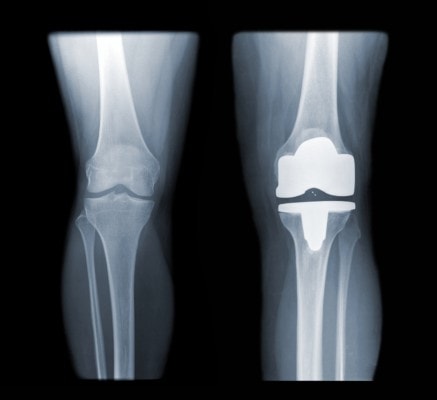Poorer Results for Knee Replacements in Younger Patients
We have a problem. We have convinced a generation of younger knee arthritis patients through commercial advertising that a knee replacement will “fix” their knee. However, this isn’t really true. Now another new study shows that while older patients have more severe arthritis than younger knee replacement patients, younger patients report poorer results with the procedure.

The knee on the right has been replaced. Skyhawk X/Shutterstock
Prior Studies on Knee Replacements in Younger Patients
In addition to device manufacturers’ advertising, you may find articles sponsored by these companies plugging early replacements as a better option, but what does the research say? I’ve posted a lot of research on knee replacements in young patients over the years that simply don’t support knee replacements in younger patients.
The most pressing reason patients give for having a knee replacement is pain, and as you probably already know if you read my blog regularly, pain is the most common complaint following a knee replacement. While you might think having a knee replacement at a younger age may give you a better chance at less pain, the opposite is actually true—patients who are younger at the time of their knee replacement are more likely to have more pain following the surgery. And since these younger knee replacement patients have more pain, research shows that these younger patients also needed more drugs (e.g., analgesics, nerve drugs, narcotics) to address the pain.
In September of last year, I shared a study published in 2015 revealing that there were over 7 million Americans with either artificial knees or hips, and the research established trends that included a shift to younger age patients receiving knee replacements. It’s worth noting here that this study was based on 2010 data, so these numbers have likely gone up as a greater number of younger people have these surgeries.
So what about a partial knee replacement? Does this improve outcome for knee replacements in younger patients as all the advertising promises? In this procedure, surgeons replace just one part of the knee, typically the inside or outside compartment. In 2013 I shared study results showing early failure in some of these partial knee replacement prostheses, bone loss around the device, and higher revision rates in younger patients with only 85% lasting five years.
RELATED
>> Alternatives to Knee Replacement Surgery
>> Regenexx Knee Patients’ Registry of Outcomes – Over 11,125 tracked nationally
>> Before and After MRI Knee Images
New Study Shows Poorer Results in Younger Patients with Knee Replacement
The new study compared both severity of arthritis and outcome scores in younger knee replacement patients (age 55 or younger) and older knee replacement patients (age 65–70). While the older patients had more severe arthritis than the younger patients, the younger patients reported lower outcome scores, particularly, again, reporting more pain than their older counterparts. Why do these younger patients with less severe arthritis have poorer results with knee replacement?
First, younger patients have higher activity levels. They expect more from a knee replacement. These prostheses are designed for older people whose only exercise may be a brisk walk around the block. Also, the fact that these younger patients have a need for an early knee replacement may mean that there are systemic issues causing the joint to degenerate, which may predispose these patients to a less favorable outcome. Finally, the pain may not have even been coming from the knee.
The upshot? There’s a bus in my town that runs ads paid for by the local hospital that preaches shiny, new knees to the young and hyperactive masses. This week, a middle-aged guy or gal will enter a surgical suite in that hospital, be prepped for surgery, and then have his or her knee amputated and replaced with an artificial one. A year from now, there’s a good chance that patient will still be in pain and will still be popping pain medication. Five years from now, that younger patient may be one of the 15% who will have to undergo revision due to a failed knee replacement. There’s also a significant chance that he or she will be like one of the patients in this study who ended up with poor results. I can only hope that patient is reading now and realizes knee replacement may not be the right “fix” for his or her knee.

NOTE: This blog post provides general information to help the reader better understand regenerative medicine, musculoskeletal health, and related subjects. All content provided in this blog, website, or any linked materials, including text, graphics, images, patient profiles, outcomes, and information, are not intended and should not be considered or used as a substitute for medical advice, diagnosis, or treatment. Please always consult with a professional and certified healthcare provider to discuss if a treatment is right for you.
